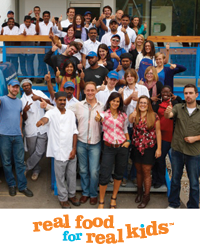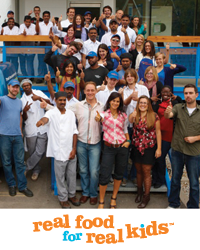
Real Food for Real Kids
 bh IN BRIEFInterview with david farnell, CEO and Founding Dad, Real Food for Real Kids, Toronto.
RFRK’s first partner in 2004 was Max’s daycare at the YMCA Family Development Centre in Toronto. In 2010-11, with a staff of 65, RFRK served 8,000 kids every day in 170 daycares and schools – a total of 2.4 M meals and 1.2 M snacks. By serving fresh, balanced, healthy lunches and snacks to kids on a daily basis RFRK hopes to reconnect children and families to real food and build habits of healthy eating. Much of its success as a business is attributed to Village Life at RFRK which illustrates Farnell’s belief that any business that can link its employees to a core purpose has the foundation for all the workings of a great workplace . For more information: www.rfrk.com
Sources: (1) David Farnell was guest speaker at a Pathways to Business Health Symposium in Toronto, October 26, 2012.
|
In 2004, David Farnell founded Real Food for Real Kids (RFRK). With his wife, Lulu Cohen-Farnell, he turned frustration with available food options – especially for children – into a growing and award winning food service business that connects children and families to real food and healthy eating. David is a strong advocate for local food economies and a tireless defender of a workplace culture built on shared core values.1 1. What was your motivation to start the business?My wife Lulu and I were unhappy with the food our 11-month old son Max was getting at his daycare. On investigation, we found that there simply was no fresh, cooked from scratch, food option available to the childcare community. We felt a need to change the way children eat and understand food, and those feelings evolved into a mission to reconnect children and families to real food. By real food, we mean food we cook ourselves using only whole, allnatural ingredients from local sources. In fact, we do more than prepare healthy foods, we partner with local farmers to get the freshest ingredients and differentiate on quality, not price and quantity. 2. What do you see for the future?We’ve already gone a step beyond being average locally-focused, all-natural, fresh-from-scratch caterers. Lulu grew up in France where a culture of developing tastes for different foods is introduced early. Here, we want to cultivate values, expand children’s palates, and enhance the nutritional IQs of all of our stakeholders. Our society’s fast food culture puts us on course for a shorter life expectancy and a lower quality of life. We want to change that and build habits of healthy eating. In future, we aim to prepare good food for workplaces and provide options for parents to take home food for their families and possibly, expand to branded products for retail. 3. You refer to the ‘Village Life’ at RFRK as integral to creating a strong culture. How has this contributed to your success?Creating a common culture (and value system) is integral to our success. We started with a clear mission that allowed us to attract staff that believed in the same thing and got meaning from their work knowing they were helping to achieve a larger purpose. That’s what makes RFRK a great place to work. We think of RFRK as a unique village with a wide array of opportunities for personal connections. Life at RFRK is characterized by both standard benefi ts such as RRSP and RESP plans, bonuses and sabbaticals, and unique features like free hot, healthy all-natural lunches and snacks & a staff vegetable garden. RFRK gives back to the wider community by sponsoring local kids’ sports teams and providing free lunch programs for schools in need, and has many activities that enhance Village Life, from staff socials, baseball games, and celebrations, to the nomination of a Chief Happiness Officer. Leadership informs our value system, but it’s the positive attributes of peers “infecting”each other that connect them to the larger, unifying purpose. 4. How do you measure success? What was the value for you of winning recognition as one of Canada’s Top 50 Best Workplaces?It was a big honour for RFRK to make both the 2011 and 2012 Best Workplaces in Canada list. We originally entered the Great Place to Work® process to get a benchmark for ourselves and for others. We thought an anonymous process would tell us about one of our key success measures – how employees feel about working here. It would also support our image with parents which has a lot to do with the stability of our clients and staff.
|
